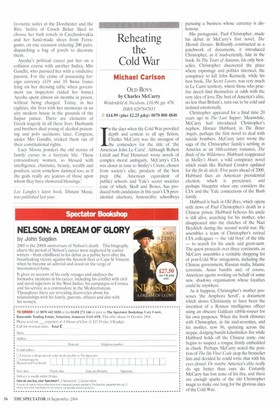Reheating the Cold War
Michael Carlson
OLD BOYS by Charles McCarry Weidenfeld & Nicolson, £16.99, pp. 476, ISBN 0297847651 ii £14.99 (plus £2.25 p&p) 0870 800 4848 in the days when the Cold War provided depth and context to all spy fiction, Charles McCarry was the strongest of the contenders for the title of 'the American John Le Carl-6'. Although Robert Littell and Paul Hennisart wrote novels of complex moral ambiguity, McCarry's CIA was closer in tone to Smiley's Circus, chosen from society's elite, products of the best prep (the American equivalent of public) schools and Yale's secret societies (one of which, Skull and Bones, has produced both candidates in this year's US presidential election), honourable schoolboys pursuing a business whose currency is dishonour.
His protagonist, Paul Christopher, made his debut in McCarry's first novel, The Miemik Dossier. Brilliantly constructed as a patchwork of documents, it introduced Christopher, as if inadvertently, late in the book. In The Tears of Autumn, his only bestseller, Christopher discovered the place where espionage and politics intersect, the conspiracy to kill John Kennedy, while his best book, The Secret Lovers, was very much in Le Cane territory, where those who practise deceit find themselves at odds with the very idea of love.The best of America's elite, no less than Britain's, turn out to be cold and isolated emotionally.
Christopher appeared for a final time 20 years ago in The Last Supper. Meanwhile, McCarty had introduced Christopher's nephew, Horace Hubbard, in The Better Angels, perhaps the first novel to deal with suicide bombers. McCarty later wrote the saga of the Christopher family's settling in America as an 18th-century romance, The Bride of the Wilderness. Hubbard reappeared in Shelley's Heart, a wild conspiracy novel which reads like Richard Condon updated for thefin de siècle. Five years ahead of 2000, Hubbard fixes an American presidential election, which is prescience, and perhaps blueprint when one considers the CIA and the Yale connections of the Bush
Hubbard is back in Old Boys, which opens with news of Paul Christopher's death in a Chinese prison. Hubbard believes his uncle is still alive, searching for his mother, who disappeared into the clutches of the Nazi Heydrich during the second world war. He assembles a team of Christopher's retired CIA colleagues — the 'old boys' of the title — to search for his uncle and great-aunt. The quest proceeds over three continents, as McCarry assembles a veritable shopping list of post-Cold War antagonists, including the Chinese government, Russian mafia, Islamic terrorists, Asian bandits and, of course, American agents working on behalf of some new, shadowy organisation whose loyalties could lie anywhere.
As it happens, Christopher's mother possesses 'the Amphora Scroll', a document which shows Christianity to have been the invention of a Roman intelligence officer using an obscure Galilean rabble-rouser for his own purposes. When the book climaxes with Christopher, in his mid-seventies, and his mother, now 96, sprinting across the steppe, dodging bandit kalashnikov fire while Hubbard holds off the Chinese army, one begins to suspect a tongue firmly embedded in cheek. Perhaps McCarty noted the position of The Da Vinci Code atop the bestseller lists and decided he could write that with his eyes closed. Or maybe America's elite really do age better than ours do. Certainly McCarry has lost none of his fire, and there are enough sparks of the old Christopher magic to make one long for the glorious days of the Cold War.


















































































 Previous page
Previous page